The Role of Television and Digital Media in the Early Years.
Patricia Edgar
Australian Education Union Early Childhood Conference September 5th 2009
When I was young my favourite time of day was when the lights went out and in bed, in the dark I could imagine. I could do anything, be anybody, go anywhere. I loved to be read a story. I developed a passion for comic books and radio shows. Nothing pleased me more than going to the pictures. It didn’t matter what film was on I enjoyed them all. When I was studying I escaped to films as often as possible. Our first television set was acquired after we were married and by then, as a secondary school teacher, I used to keep quiet in the staff room when teachers talked about the evils of television and how much they didn’t watch. I was certainly watching.
I have worked with children all my life in teaching, research, policy and production roles - all related to media - yet my 4 extremely interesting grand children can still teach me a thing or two. The speed of technological change is not a concept that means anything to them. Technology is nothing special.
My work has me convinced that media have a profound influence on the brain power, the attitudes and creativity of children and ignoring that influence will ultimately lead to schooling becoming obsolete, for media in its many forms are transforming children’s lives.
With me today is my grand son Adrian who is 14.
When I was in the UK- for the last two months - the US investment Bank Morgan Stanley released a Research report, prepared by a 15 year old intern, who had surveyed his friends and written about their media consumption. The lad, Mathew Robson, became the talk of Wall St and Tokyo as clients such as Google and Facebook, reportedly clamoured for a copy of what they considered the teenagers’ ground-breaking insights. Who would have thought that the best way to find out what teenagers’ were doing with media was to ask them?
The insights the report exposed included:
- No teenager regularly reads a newspaper
- They listen to the radio online
- they all own mobiles but use them for texting and listening to music not to make calls: they are very reluctant to pay for music- most never having bought a CD
- they talk to one another via their games consoles
- they do not Twitter considering it a waste of money,
- Facebook is the most common social networking site used.
In other words they adapt media and take advantage of every free feature on every gadget, and pool applications so they are as connected as any media savvy adult, but they don’t pay for the privilege.
They mould the technology to fit the rhythm and needs of their own lives which differ from the average grown-up’s day to day experience. (1)
Adrian, will talk with me a little later about his and his friend’s media usage.
A few months ago I spoke at a workshop attended by some early childhood teachers and I encountered strong hostility to the media. I was told that the first action two of them had taken at the beginning of the year was to put the computer in the cupboard. Their view was that while children were in their care they could play outside or with others; they got enough media at home.
Children must play outside, no question, but early childhood education is about all their learning and development - at home, playing with friends or alone and in pre-school. What happens in every context influences their learning, and children’s interaction with media is far too important to exclude it from their school experience.
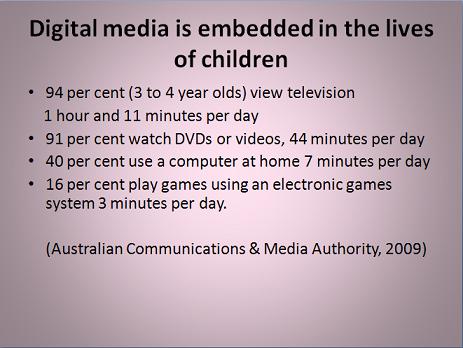
There are 4 main reasons why I believe media technologies should be included in education programs for the early years?
1. Media are an unavoidable part of children’s family and social context
By the end of primary school Australian children are accessing media more than 7 hours a day, more time than they spend in school or with their parents.
They are immersed in media.
2. A second reason to include media in early childhood development and learning is to develop media literacy as a critical skill.
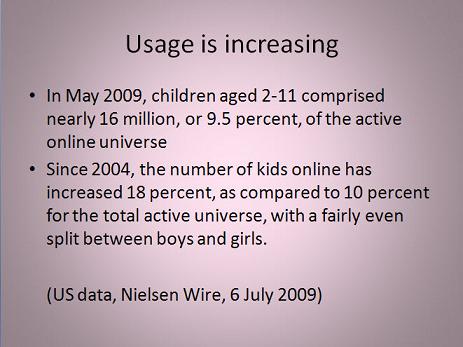
The earlier children become familiar with technology the better understanding and control they will have. Three year-olds can learn to manipulate a mouse and should be encouraged to do so.
By the time they enter school children are consumers, attuned to the market. The characters they recognize from their television programs when they go shopping with Mum are linked to games, books, music and all sorts of paraphernalia, including food. They see these products and they want them.
Media literacy should not simply be about having technical skills, being protected from invasive advertisers or making an amateur video for YouTube: it should be about accessing, understanding, using and creating media.
3. The third reason to include media in the early childhood curriculum is to avoid what is called the Digital Divide:
The digital divide is especially wide for kids from poor home backgrounds and from homes where parents don’t see or value the use of the computer, the internet or computer games for kids’ learning. If children are not exposed to and taught how to use technology, they will be disadvantaged.
Those who enter school with no formal pre-school education are already a year behind their peers at age 5. Lack of exposure to new technology widens the gap.
4. And the 4th reason is that technology has enormous potential to help children learn.
We all know now that most of an individual’s brain power is generated in the first years of life, especially between birth and age 3, but certainly up to the age of 8.
It was Howard Gardner who first pointed out the danger in the narrow definition of intelligence, as measured by IQ tests we have relied on for so long. Every child needs to be given a chance to develop a range of skills, not just language and mathematics.
- Let’s look at the potential of television and games for the development of Howard Gardner’s multiple intelligences particularly interpersonal and intra personal intelligence or emotional intelligence.
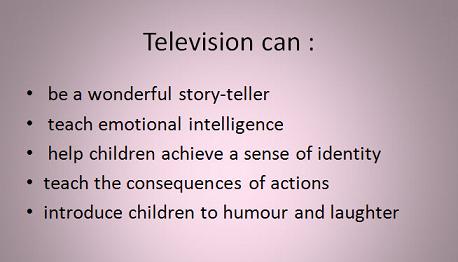
- Stories are the glue that binds us together as a community. That is why local programming is important for children.
- Like good books, good television programs can help children develop emotionally, through trying out roles not yet possible in the real world
- The 0-5 age group are forming their sense of identity within their family, in a sex role, outside the family and within an ethnic or racial group. Television programming can feed into this emerging social self with a wide range of role models. Lift Off which I devised in 1990 had its origins in this philosophy. And I hope such a concept will get a new lease of life within the new national early childhood curriculum.
- Toddlers are on a journey to understanding the consequences of their actions. Through stories they can learn you can’t always win and life is not just a competition.
- Young children love to laugh. Humour is a great way to engage children. Round the Twist which I first produced in 1989 was developed with this intention. Many children began to read on their own through the Round the Twist series.
Many of life’s lessons can be conveyed through stories in books, on film, video, DVDs and television. They need to be selected with care which takes time and effort. Then if we build on the learning within a program the learning becomes more effective.
We reject television in the classroom because so much of it is just plain awful. It is crass, commercial and banal. But the fault lies in the use to which the medium is put. It is so seductive for children, we have a responsibility to use it better than we do.
Then there are computer and video games.
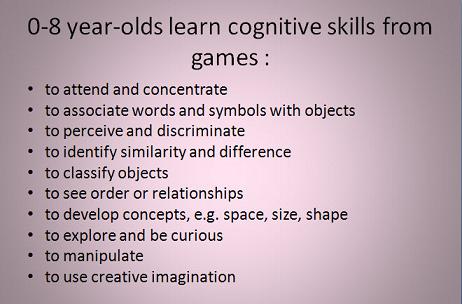
The media hype suggests games are simply bad for kids. The evidence shows otherwise. Games are effective and valuable tools for learning from a very early age and across all ages. (1)
Those who don’t play games – that includes most teachers and policy-makers - are unaware there is a science to game playing.
No one tells the kids the rules; they figure them out by playing. They seek information and piece together data from many places. They make decisions quickly which have clear consequences. They become experts at multi-tasking and parallel processing and learn to collaborate with others over a range of networks. Kids can acquire these skills at a very early age. Four and 5 year olds play The Sims (the most popular computer game ever made, which is essentially a ‘living dollhouse’) and Roller Coaster Tycoon where the goal is to create a successful theme park.
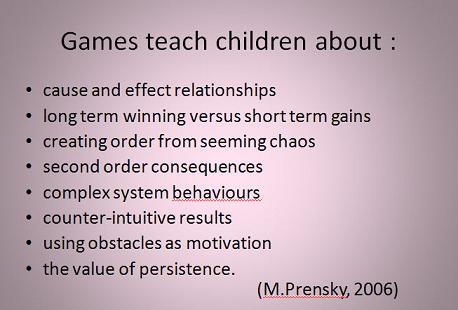
Games help cognitive development in progressively complex ways. But so far there has been little attempt to integrate game-playing into the early childhood curriculum.
Children will watch good programs and play quality games repeatedly, learning more each time, precisely because they can engage with the content in increasingly sophisticated ways. It’s hard to find school room tasks that inspire the same motivation.
The young brain’s plasticity, its capacity to learn through repetition, reinforcement and forging new connections make good media experiences potent learning tools.
Technology makes it possible to design programs that are not only appropriate to a particular age group, but also to different developmental levels within that age group.
To summarise:
- We should not ignore the power and potential for good rather than harm from modern technology. No early childhood curriculum framework can ignore what goes on in the home in the pre-school years. It is the child’s major learning environment and it is one saturated with media whether we like it or not.
- Many teachers are unaware, unskilled or afraid of technology and today’s children are moving way ahead of them in media literacy and computer skills.
I believe we must therefore:
Become advocates –
- for the production of quality children’s media
- to fund the development of new media content geared to the National Curriculum
- to utilise media within the early years curriculum and guide that use effectively
- to train and re-train as teachers and early childhood professionals to be media literate and up with the skills of the children we teach.
.
References
1. Teenage kicks tell all in the gadget age, Sophie Morris, The Independent , July 15, 2009
2. V(For a parent's guide to video games see Jeannie Novak and Luis Levy, Play the Game, Thompson Course Technology 2008, (http://www.courseptr.com)
3. Mark Prensky (2006) shows in his book ‘Don’t bother me Mum, I’m learning’











